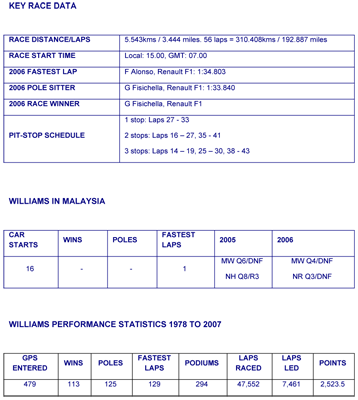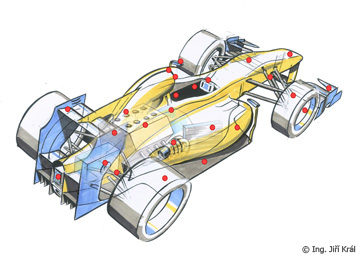Tiskov├Ī informace - WilliamsF1 (EN)
Miroslav Sanytr├Īk | 7.4.07 | Aktuality
MALAYSIAN GRAND PRIX PREVIEW 2nd APRIL 2007
Malaysia hosts round two of the FIA Formula One World Championship this weekend as the teams travel to Asia for the second of the three long haul races of the season on Sunday 8th April. This yearŌĆÖs race will be the ninth time the state-of-the-art Sepang circuit, located just south of the countryŌĆÖs capital, Kuala Lumpur, has featured on the Grand Prix calendar. For the first time, the teams were able to test at the Sepang track prior to the race which afforded the AT&T Williams team additional time to work on car set-up and reliability. Combined with the opportunity to acclimatise early to such extreme conditions, the team are looking forward to build on its solid start to the 2007 campaign.
Nico Rosberg
I have good memories of Malaysia from last year when I made my debut on
the Sepang track. It is a good circuit from a driverŌĆÖs perspective; the layout has
a bit of everything, with plenty of fast and slow corners. The surface is quite
bumpy which also gives it an extra dimension. The most challenging aspect of
the Malaysian Grand Prix is obviously the heat and humidity. I"m well prepared
though, as is the team, and weŌĆÖre looking forward to having a good race this
weekend.
Alex Wurz
Malaysia is a very cool race track. It has quite a difficult corner section, which
IŌĆÖve always enjoyed ever since I first drove on this track. It is very challenging to
get the set-up right for it though, but the toughest part of the race will be the
heat for the majority of the drivers. This is the race where a disciplined training
programme really pays off. In last weekŌĆÖs test, I covered over 200 laps in two
days which was a good test for me and for the reliability of the car in such
extreme conditions. The race simulation we did also went very well. We wonŌĆÖt
see the true performance of the teams until the race weekend, but IŌĆÖm sure itŌĆÖs
going to be another super close Grand Prix.
Sam Michael, Technical Director, Williams F1
Kuala Lumpur is all about high levels of rainfall, humidity and temperatures! It is
so tropical and the daily thunderstorms upset the normally routine practice
sessions. As we tested there last week, a lot of the data and sign-offs that the
engineers normally have to rush through during the practice sessions are
already done. Brakes, cooling and tyres have all been measured and we now
have a good direction for the race. As such, we will be able to
spend most of practice working on car set-up and re-checking the
balance on the two Bridgestone Potenza tyre compounds because
the circuitŌĆÖs grip levels will vary from the test.
The Sepang circuit is dominated by medium and high speed
corners, but does have three slow speed corners as well. Add to
that three decent straights which reward engine power and low
drag, this circuit has a good balance for drivers and engineers to
work with. There are overtaking opportunities into the first, third
and last corners that will undoubtedly contribute to an exciting
race. Pitstop strategy will most likely be a standard two stop affair.
The track layout is hard on tyres so the degradation levels donŌĆÖt
normally permit a one stopper, and the pitlane is too slow for a three stop race.
After the first race in Melbourne, the initial picture of where the true
team order lies is starting to form, but it will take another few races
to settle, and can obviously change over the season if one team
makes a much bigger gain than another. At the test last week, we
worked hard on set-up and getting more performance out of the
FW29. We made some progress, but the real measure will be how
we fare over the race weekend.
Sepang, Malaysia
A purpose-built facility, SepangŌĆÖs 5.543km lap provides a blend of
medium and high speed corners interspersed with several slow
speed sections and blisteringly fast straights. Such a dynamic track
poses a particular challenge for the drivers and their engineers as
a quick lap depends on a car with a well balanced set-up for the
complex mix of corners, plenty of power for the quick straights and
sufficient cooling capabilities to counterbalance the extremes of
temperature and powerful humidity.
With temperatures reaching 40┬░C in Kuala Lumpur, climatic
conditions can play a significant role in the outcome of the
Malaysian Grand Prix. Coupled with the high humidity levels and
the constant threat of heavy downpours, the drivers and their cars
will be pushed to thermal limits. As temperatures soar so will the
heat in the cockpit, and the driverŌĆÖs physical and mental fitness
levels will be severely tested as they lose over a litre of fluid per
hour in the race. Engines will also be strained as they are fired up
for a second outing in Malaysia. Sepang is not regarded as a power circuit, with the time spent at full throttle relatively low, but
containing oil temperatures in the extreme heat, while not
compromising aerodynamic efficiency, will be imperative for their
reliability.
|





